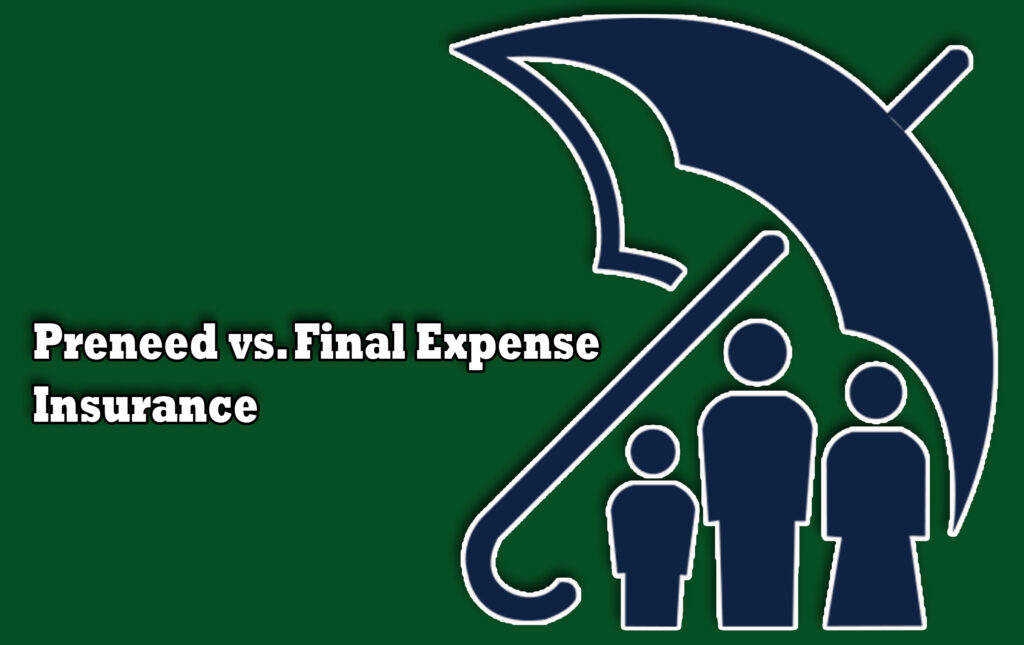Preneed vs. Final Expense Insurance: What’s the difference?
When it comes to planning for the inevitable, preparing for end-of-life expenses is a responsible and considerate decision. Two of the common ways to cover funeral and burial costs are preneed insurance and final expense insurance.

While both serve the same purpose of easing the financial pressure during difficult times, they are actually designed differently and serve different goals.
Furthermore, choosing between preneed and final expense insurance involves understanding how each works, who controls the funds, what is covered, and how flexible the policies are.
Making the right decision depends on your personal wishes, financial goals, and the level of control you want over your final arrangements.
What is Preneed Insurance?
Preneed insurance is a type of prepaid funeral plan arranged directly with a funeral home. It is often used to fund a specific funeral service in advance, locking in current prices for goods and services related to burial or cremation.
What’s more, this policy is typically purchased through a funeral provider and outlines every detail of the funeral arrangements.
Characteristics of Preneed Insurance:
- It is tied to a specific funeral home or provider. So once you purchase the policy, it is often non-transferable.
- The costs are locked in at today’s rates, which can protect against future inflation.
- Additional, the funds go directly to the funeral home, not to surviving family members.
- It also covers a detailed plan, including casket, service type, transportation, and obituary notices.
It is Best For:
- Individuals who want full control over how their funeral will be conducted.
- Those who want to relieve their families from the burden of planning or decision-making.
- People who are comfortable with one specific funeral home managing the services.
The Preneed insurance is less flexible, but it offers the peace of mind that everything is pre-arranged exactly as you wish.
What is Final Expense Insurance?
Final expense insurance, also called burial insurance or funeral insurance, is a type of whole life insurance that is meant to cover the costs associated with end-of-life expenses.
These policies offer a cash benefit to beneficiaries, who can then decide how to use the money. They can make use of the funds for a funeral, outstanding medical bills, credit card debt, or other final costs.
Here are the key characteristics of Final Expense Insurance:
- It provides a lump-sum payout to the beneficiary, usually a family member or trusted individual.
- The money can be used for funeral costs or any other expenses, making it flexible.
- The funds are available in small coverage amounts, typically ranging from $2,000 to $25,000.
- In addition, there is no medical exam required in many cases, which means policies are often easy to qualify for.
This Policy is Best For:
- People who want their family to have financial support but also flexibility in planning the funeral.
- Those who may not have access to or don’t want a traditional life insurance policy.
- Seniors and individuals with health concerns who want affordable, simplified coverage.
Final expense insurance offers more flexibility and control for surviving loved ones, though it does not guarantee specific funeral arrangements.
Preneed vs. Final Expense Insurance: Differences
While both types of insurance serve the same ultimate goal covering costs after death, they differ significantly in terms of structure, flexibility, and control. Let’s look at the major differences between the Preneed and final expense insurance:
| Features | Preneed | Final Expense |
| Ownership and Control | Funeral home controls the funds and services | The beneficiary controls the payout and usage. |
| Flexibility | Less flexible; tied to a specific provider | Highly flexible; usable for any purpose. |
| Coverage Amounts | Based on itemized funeral costs | Offers a fixed cash benefit. |
| Payment Terms | Often paid in installments or lump sum to the funeral home. | Premiums paid monthly or annually to an insurance company. |
| Portability | Not portable; typically locked to one funeral provider | Fully portable; not tied to any funeral home |
Understanding these distinctions will help you determine which type of coverage aligns with your values, budget, and wishes for your loved ones.
Frequently Asked Questions
Can I Have Both Preneed and Final Expense Insurance?
Yes, it’s possible to have both. Some people choose to use preneed insurance to cover specific funeral services and final expense insurance to provide additional support for other bills or family needs.
What Happens If I Move to Another State After Purchasing Preneed Insurance?
Preneed policies are usually tied to a specific funeral home. If you move, transferring the policy can be complicated or sometimes not allowed. Hence, you must always check for portability before buying.
Is a Medical Exam Required For Either Type?
Final expense insurance typically does not require a medical exam. Preneed insurance also usually skips health checks since the plan is service-based, not risk-based.



